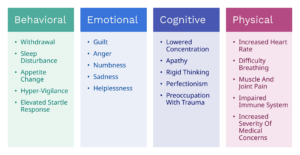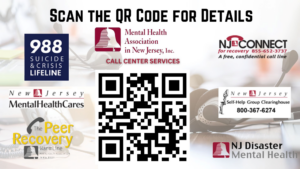By: Cathy Salomon, MA, MBA and Taylor Transtrum

While most of us are familiar with the term “burnout,” a lesser known term which can lead to burnout and stress is “compassion fatigue.” Read on to learn about the toll of compassion fatigue and burnout—and how we can combat the two in order to achieve compassion satisfaction.
Understanding Compassion Fatigue
Compassion fatigue occurs as the result of experiencing a combination of secondary traumatic stress and burnout. Secondary traumatic stress (STS) impacts us cognitively, emotionally, behaviorally, and physically. Without boundaries, we neglect our own needs and put others needs above ours, which can then turn into compassion fatigue.
The chart below illustrates cognitive, emotional, behavioral and physical signs of compassion fatigue to look out for.

How is Burnout Different from Compassion Fatigue?
While compassion fatigue is caused by a combination of secondary traumatic stress and burnout, burnout can exist on its own without secondary traumatic stress. Burnout can also happen in any profession, since burnout has more to do with the workplace than the work itself.
Rather than leaving your profession altogether, it’s better to examine what in your current work environment is contributing to your burnout. In order to resolve burnout, the environmental factors causing it need to be addressed as soon as possible. Some of the most common factors that lead to burnout include inadequate supervision, lack of support, micromanagement, and underwhelming or overwhelming tasks.
A healthy work environment in which employees are respected, treated well and supported in their needs prevents burnout.

What is Compassion Satisfaction?
Compassion satisfaction is defined as “The pleasurable and satisfying feelings that come from helping others.”
It’s because of compassion satisfaction that people are drawn to altruistic fields of work—such as mental healthcare, social work, mental health crisis care, teaching and healthcare of many kinds, among other fields—as well as volunteering.
Signs of compassion satisfaction are experiencing feelings of fulfillment, reward, achievement, enrichment, inspiration, hope and gratitude.
Compassionate and empathetic people are often driven towards careers where they can help others or a cause that is important to them. This type of work can be both difficult and overwhelming, while also being highly rewarding at the same time.
In order to achieve and maintain compassion satisfaction, it’s important to recognize the signs of compassion fatigue and burnout, and create boundaries around your work and taking the time for self-care.
Coping with Compassion Fatigue & Achieving Compassion Satisfaction
Compassionate and empathetic people tend to throw themselves fully into their work and/or causes that matter most to them. As a result, they are more likely to experience secondary stress and burnout, which can lead to compassion fatigue. In order to prevent this, or recover from it, it’s important to implement boundaries and self-care practices into everyday life. After all, you need to take care of yourself first in order to have anything left to give to others.
Here are some ways to achieve compassion satisfaction:
- Let go of what you can’t control
- Practice setting aside a designated “worry time” for half an hour to an hour. When you feel overwhelming feelings of worry pop-up outside of this time, make note of what you’re worried about and save it for later during your “worry time.”
- Talk it out
- Accept that overwhelming feelings are natural. A few ways to deal with these feelings are journaling, talking to a friend/loved one, and talking to a therapist.
- Take small breaks during the work day
- When stress and emotion start getting in the way of your work day or peace of mind, give yourself a short break to distract yourself and relax your mind.
- This can look like a short walk around the block, heading to a coffee shop to grab a calming cup of tea, your favorite caffeinated beverage, or snack. Or, do a quick guided meditation or breathing exercise for 5-10 minutes.
- Nourish yourself & tend to your basic needs
- It can be easy to get so caught up in your work or worries that you forget basic things like eating and drinking water.
- Always have water and small snacks on hand. If you need to, set an alarm on your phone with reminders to take a snack or meal break, or even to drink a glass of water.
- Plan out healthy snacks and meals in advance, so the food you eat doesn’t end up making you feel worse.
- Get physical
- Set aside time for joyful movement, which means moving your body in a way that is joyful to you. While this can look like a full gym workout, if that’s not your thing, a leisurely walk, dance break, yoga, bike ride, etc. are just as good! It’s really up to you what ways you prefer to move your body.
- Prioritize rest
- Plan your days and evenings in advance so you’re getting a full 6-8 hours of sleep per night. Choose a regular bedtime and wake-up time for each day. This helps train your body to naturally get tired at your bedtime, and energized at your wakeup time.
- Create a sleep schedule that looks right for you and take 30 minutes before going to bed to unwind (no screens). You might need to play around with your “wind down” routine, but some places to start would be reading your favorite book, coloring in a coloring book, drinking decaffeinated tea, or taking a bath before bedtime.
- Practice saying no
- Sometimes, we may want to provide extra help by taking an extra shift, helping a coworker with a project, or taking on extra tasks inside and outside of work. But if you’re already in an overwhelming place, or you know taking on this extra work could push you over the edge, it’s okay—and even a good thing—to say “Sorry, I would love to help but I can’t take that on right now.
Your workplace environment also plays a key role in making compassion satisfaction possible. In addition to working for a cause and goals that are important to you, there are several factors to consider in your working environment.
Factors to consider when looking for a compassion satisfaction friendly workplace:
- Effective communication, teamwork, collaboration
- Appropriate staffing
- A culture with meaningful recognition
- Effective leaders that promote a culture of caring
- Professional development opportunities
- Debriefing
- Eliminating distrust and intimidating behavior
While workplace stress is inevitable, it cannot be emphasized enough that your workplace should be a safe space to voice feelings of burnout and need for additional support. If you’re having difficulty with any of the above factors, voice to your supervisor what the problem is and what additional support you need. If they aren’t receptive to you asking for help, it may be time to look for another job that fulfills your needs.

Final Thoughts
Remember, help is just a phone call away. If you are having suicidal thoughts or experiencing a mental health crisis, please dial 988 to reach the 988 Suicide & Crisis Lifeline. For New Jersey residents, to find mental health services in your area, and receive emotional support, please call the NJMentalHealthCares Hotline at 1 (866) 202-4357. The Mental Health Association also has services that are geared towards specific populations such as individuals suffering with substance misuse, those seeking peer-to-peer connection, and even those interested in starting or joining a support group.
For additional mental health support—including virtual therapy, psychiatry and medication management—schedule a free consultation with Valera Health using this form or by calling (646) 450-7748.
[Disclaimer: The Mental Health Association in New Jersey is not affiliated, associated, authorized, endorsed by, or in any way officially connected. Valera Health. MHANJ provides referrals to various mental health facilities, serving underserved populations throughout the state of New Jersey. All product and company names are trademarks™ or registered® trademarks of their respective holders. Use of them does not imply any affiliation with or endorsement by them.]